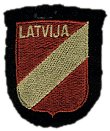Nazi Germany conscripted some 110,000 Latvian men into the service of the Waffen-SS to fight against the advancing Red Army on the Eastern Front.1 Archival records indicate that as circumstances became desperate for Nazi Germany, Berlin even dangled the prospect of the return of Latvian civilian authority over still-occupied territory in return for continued Latvian resistance to the Soviet advance—Latvian forces held out to the end of the war in Courland, the only territory on the Eastern Front not taken by the Red Army.2
The contention today that Latvians fighting against the Soviets were fascists and all Legionnaires are war criminals convicted at Nuremberg, prevalent in today's official Russian position branding commemorations of the Legion as "glorification of Nazism," is a post-Soviet construct. That Latvians fought against the Red Army was totally missing from Soviet history taught in schools.3
A closely related issue is that materials on the Holocaust in Latvia variously conflate:
- the pre-war Aizsargi (National Guard);
- Latvian fascist Pērkonkrusts;
- the Nazi-Germany organized:
- Hilfspolizei—order-keeping police initially under the Wehrmacht; also generically used to describe any actual self-policing between occupations as the Red Army retreated;
- "police" units subordinated to the the German Sicherheitsdienst ("SD") implicated in the Holocaust, including police brutalizing Jews at the Rīga Prefecture and the notorious Arājs Kommando;
- Schutzmannschaft ("Schuma")—including police battalions; some participated in the Holocaust, others were the subject of Soviet show trials with officers convicted and shot even though they were not present when alleged and the Nazis, according to their own records, had already killed the Jews; while widely tarred as all being war criminals, the historical facts are far more complex.
- Selbstschutz—security focused on strategic assets, protecting the frontier, etc., not involved in the Holocaust.
- Waffen-SS (the Latvian Legion)—Eastern Front combat units not involved in the Holocaust; and
- Askaris—Russian POWs of the Germans organized in combat units on the Eastern Front but described in Soviet archives as Ukrainians, Latvians, and Lithuanians with no mention of Russians.
These materials often falsely affirm that all equally and actively participated in the Holocaust, and furthermore, that they did so independently of the Germans, even prior to the arrival of the Germans—the alleged "Germanless Holocaust."
This underscores that the role of the Latvian Legion in World War II has become an object of political, not historical, interpretation, independent of facts:
- The Latvian Waffen-SS, being formed in 1943, did not exist during the Holocaust and were not involved—no one has ever been accused of a war crime while in the service of the Legion;4
- The Latvian Legion were conscripted despite the German title of the unit as "voluntary." It was that or dig ditches on the front or be shot. Those that volunteered did so only to fight against the Soviet re-invasion. The first few hundred were forced to take the SS oath. That oath caused such outrage that all subsequent conscripts were still obligated to swear an oath to Hitler—but only as military commander in the fight against Bolshevism. There was no personal oath to Hitler, no oath supporting Nazi policies or genocide.
- Hitler's elite SS organization was convicted at Nuremberg—whereas veterans of the Latvian Legion were stationed at Nuremberg as Allied guards.
The Soviet show trial and U.S.S.R. are long dead, but Latvians continue to be vilified in the kangaroo court of political expediency, prejudice, and ambition—victims of a lie so big that it must be true. Ironic that the most vociferous critics alleging "Latvian Nazism" employ a propaganda technique invented by none other than Hitler himself.
Today, Russian authorities have hijacked the very cause of anti-Nazism. World Without Nazism, an "international organization" created and run by Putin insider Boris Spiegel, wages an "anti-Nazism" campaign which paints any anti-Sovietism and post-Soviet resistance to Russian aggression as Nazism. Indeed, World Without Nazism invites and hosts foreign politicians to picket and protest against the annual Latvian memorial commemoration of the Latvian Legion. Latvia—where honouring her fallen sons who held out in Courland to the end of the war hoping to drive out both German and Russian invaders and repeat the miracle of independence after WWI is instead the object of prejudiced and ignorant political vitriol, one American politician even decrying it as "a breathtaking symbol of the resurgence of Nazi movements across the world."5
| 1 | Zaķe, Ieva. American Latvians: Politics of a Refugee Community. Transaction Publishers. 2011. p.92. |
| 2 | Archival documents show that as the end of the war approached, the Germans held out the promise of the restoration of Latvian sovereignty. |
| 3 | Overcoming the Legacy of History for Ethnic Integration in Latvia, Ieva Gundare, The Museum of the Occupation of Latvia, (1940-1941). |
| 4 | Nevertheless, the Justice Department's OSI division upon losing the Hāzners case despite the Israeli government coaching witnesses to identify Hāzners as a war criminal, appealed their loss solely on the basis that Hāzners had been a member of the Latvian Legion. |
| 5 | Nazis? Again? Really? posted March 13, 2013, retrieved at www.huffingtonpost.com/ |
